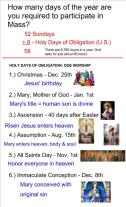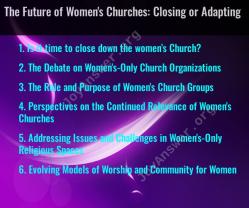What does 1 mean biblically?
In the Bible, the number 1 is often associated with several significant spiritual and symbolic meanings, with an emphasis on unity, oneness, and the singularity of God. Here are some key biblical interpretations of the number 1:
Monotheism: The Bible is clear in its monotheistic belief in one God. The number 1 represents the uniqueness and singularity of the Almighty, emphasizing that there is only one true God. This central tenet is found throughout both the Old and New Testaments.
Oneness of God: The Bible teaches that God is indivisible and without peer. Passages such as the Shema in the Old Testament (Deuteronomy 6:4), which states, "Hear, O Israel: The LORD our God, the LORD is one," underscore the oneness of God's divine nature.
Unity of Believers: In the New Testament, the concept of unity among believers is strongly emphasized. The Apostle Paul, for example, encourages unity among Christians in various passages (e.g., 1 Corinthians 1:10, Ephesians 4:3). The number 1 can symbolize the unity of the body of believers.
First and the Last: In the book of Revelation, Jesus is referred to as the "Alpha and Omega, the First and the Last, the Beginning and the End" (Revelation 22:13). The emphasis on "the First" points to the preeminence and singularity of Christ.
God's Sovereignty: The number 1 can also symbolize God's sovereignty and His position as the ultimate authority and ruler over all creation. It reflects His unrivaled power and dominion.
The Beginning: The number 1 is often associated with the concept of the beginning. It can signify the commencement of God's creative work, His divine plan, and the start of a new era or covenant.
Indivisibility: The number 1 can represent indivisibility and completeness. It emphasizes that God is whole and lacking nothing, and His attributes are not fragmented.
Overall, the biblical meaning of the number 1 underscores the foundational belief in the one true God and the importance of unity, oneness, and the singularity of divine authority. It is a symbol of the central monotheistic faith of the Bible and the unique position of God in the Judeo-Christian tradition.
The number 1 has a special meaning in the Bible. It is often used to represent unity and oneness. For example, the first verse of the Bible states, "In the beginning God created the heavens and the earth" (Genesis 1:1). This verse emphasizes the unity of God and His creation.
Another example of the number 1 representing unity and oneness is the Shema, which is the central prayer of Judaism. The Shema states, "Hear, O Israel: The Lord our God, the Lord is one" (Deuteronomy 6:4). This prayer emphasizes the oneness of God and the importance of unity among His people.
The number 1 is also used in the Bible to represent the unity of the Trinity. The Trinity is the Christian doctrine that God is one being in three persons: the Father, the Son, and the Holy Spirit. While the Trinity is a complex mystery, the number 1 emphasizes the unity of God in three persons.
Here are some other examples of the number 1 representing unity and oneness in the Bible:
- Jesus taught his disciples to pray, "Our Father in heaven, hallowed be your name, your kingdom come, your will be done, on earth as it is in heaven" (Matthew 6:9-10). This prayer emphasizes the unity of God's people and the unity of His will.
- The apostle Paul wrote, "For there is one body and one Spirit—just as you were called to the one hope that belongs to your call— one Lord, one faith, one baptism, one God and Father of all, who is over all and through all and in all" (Ephesians 4:4-6). This passage emphasizes the unity of the church and the unity of God's people in Christ.
The number 1 is a powerful symbol of unity and oneness in the Bible. It reminds us that we are all children of God and that we are all united in Him. It also reminds us of the importance of working together to build unity in the church and in the world.












